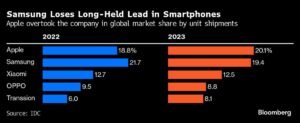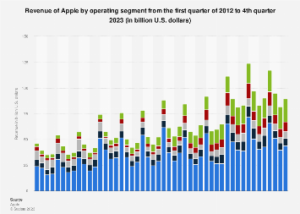Apple Inc.’s iPhone surpassed Samsung Electronics Co.’s handsets to become the best-selling smartphone series throughout 2023.It is the first time South Korea’s biggest firm has lost the top rank since 2010.
The International Data Corporation (IDC) reports that last year, the phone behemoth based in America accounted for over one-fifth of all phones shipped.
Samsung, with 19.4% of the market has three Chinese phone manufacturers Xiaomi, OPPO, and Transsion trailing behind.
Sales of smartphones have decreased because so many people upgraded during the outbreak.
Nearly 1.2 billion smartphones were sold last year, according to IDC, a decrease of more than 3% from the year before. Due to the economic downturn and rising loan rates, many consumers have tightened their purse strings, resulting in the lowest amount sold in a decade. Experts anticipate that this year will see a market recovery.
Apple surpasses Samsung
According to research firm IDC, the iPhone accounted for about 235 million shipments last year, or a fifth of the global market. Samsung emerged in second place, ahead of Chinese smartphone manufacturers like Xiaomi Corp., whose shipments fell by double digits to 226.6 million.
Even so, Apple, was deemed “the biggest winner” by the IDC.
“Not only is Apple the only player in the Top 3 to show positive growth annually, but also bags the number 1 spot annually for the first time ever,” Nabila Popal of the International Data Corporation stated.
“All this despite facing increased regulatory challenges and renewed competition from Huawei in China, its largest market.”
After being prohibited from purchasing chips manufactured with US technology due to allegations that the corporation poses a national security danger to the US government, Huawei has recently made progress in producing its own processors.
Interest-free financing options and offers to trade in outdated models are also boosting demand for high-end gadgets like Apple.
Samsungs’ Defeat
Although Apple has historically led the holiday quarter, its year-long push ahead of Samsung is exceptional and indicates that Apple is surviving an industry-wide downturn more skillfully than competitors.
This is bad news for Samsung, which was the leading manufacturer of memory chips, cellphones, and televisions worldwide up until this point.
The behemoth of South Korean electronics recently issued a warning, stating that the sluggish worldwide demand for consumer electronics will cause its revenues to decline faster than anticipated.
Additionally, it has competition from less expensive Android devices like Xiaomi and Transsion, which are becoming more popular in emerging economies and among users who are price conscious.
According to IDC, there is a “very interesting time” ahead for the smartphone industry, as more Android providers enter the market and consumers prioritize foldable phones with AI capabilities.
Apples’ challenges Ahead
Local tech giant Huawei, which recovered some of the market share it lost during US sanctions by releasing the Mate 60 Pro smartphone relying on a sophisticated made-in-China chipset, poses a challenge to Apple in the largest mobile market in the world.
This week, Apple launched infrequent nationwide discounts on the iPhone, up to 5% off each device, in an effort to stop future declines in sales.
Apple profited from aggressive promotions that encouraged a switch to high-end gadgets. Despite the iPhone 15 receiving a lackluster response towards the end of the year in China, its largest overseas market, where sales are being negatively impacted by Huawei Technologies Co.’s expanding popularity and a rising prohibition on government use, the company was still able to increase shipments in 2023.
“Apple is by far the biggest winner, but we did see some strong growth from low-end Android players like Transsion and Xiaomi in the second half of 2023, stemming from rapid growth in emerging markets,” Nabila Popal, research director at IDC, stated.
Apple has not been spared from the broader decrease, despite being the only one of the top three players in the world to record growth (3.7%). The most recent iPhone’s sales in China are substantially lower than those of its predecessor, and some analysts predict that these declines will continue.














